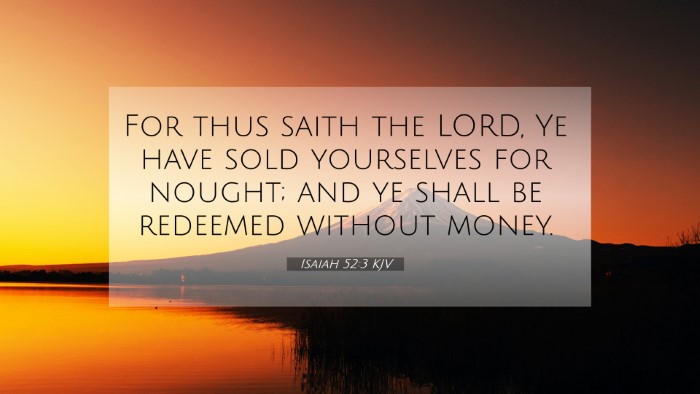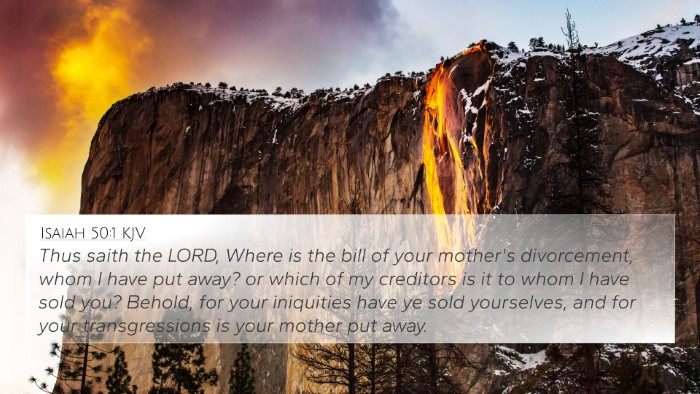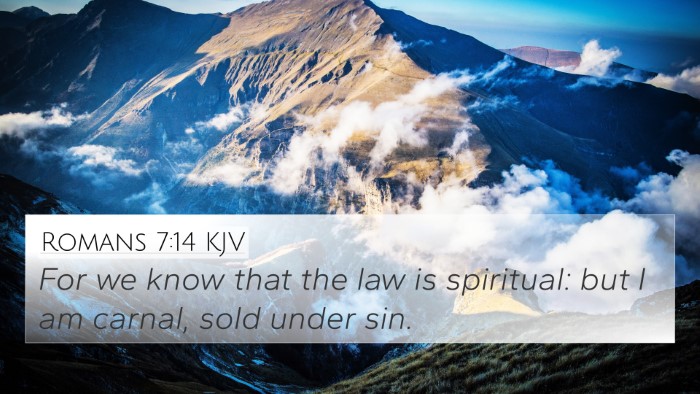Understanding Isaiah 52:3
Isaiah 52:3 states: "For thus saith the Lord, Ye have sold yourselves for naught; and ye shall be redeemed without money."
This verse brings to light profound themes of redemption and freedom that resonate deeply within both the Old and New Testament frameworks. The passage illustrates a twofold message: the acknowledgment of captivity yet the promise of divine redemption.
Key Themes and Insights
- Redemption without Cost: The verse indicates that the Israelites had metaphorically 'sold' themselves into captivity or servitude due to their sin. Yet God promises that their redemption will not come at a monetary price, but rather through His grace and power.
- The Nature of Sin: The commentary from Matthew Henry highlights that the people had willingly indulged in sin, exchanging their freedom for bondage. This underscores the idea that sin often leads to self-imposed captivity.
- The Divine Initiative: Albert Barnes remarks on the sovereignty of God in redemption. The fact that redemption is promised without monetary cost signifies God's grace and initiative in restoring His people.
- Hope and Restoration: Adam Clarke notes that the verses surrounding this excerpt reinforce a message of hope. Despite the past failures of Israel, God's commitment to restore them is unwavering.
Bible Cross-References
To enrich the understanding of Isaiah 52:3, here are some relevant Bible cross-references:
- Isaiah 61:1 - "The Spirit of the Lord GOD is upon me; because the LORD hath anointed me to preach good tidings unto the meek; he hath sent me to bind up the brokenhearted, to proclaim liberty to the captives, and the opening of the prison to them that are bound."
- Luke 4:18 - Jesus quotes Isaiah in His ministry, emphasizing the fulfillment of liberation for the oppressed.
- John 8:36 - "If the Son therefore shall make you free, ye shall be free indeed," highlighting the spiritual freedom found in Christ.
- Romans 6:17-18 - Discusses the transition from being a servant of sin to becoming servants of righteousness.
- Galatians 5:1 - "Stand fast therefore in the liberty wherewith Christ hath made us free, and be not entangled again with the yoke of bondage," a call to maintain freedom.
- Ephesians 1:7 - "In whom we have redemption through his blood, the forgiveness of sins, according to the riches of his grace," linking New Testament themes of redemption.
- Revelation 5:9 - The song of the redeemed, praising God for their freedom through His sacrifice.
Inter-Biblical Dialogue
The verse from Isaiah engages in a significant dialogue with various scriptures throughout the Bible.
- Connections Between Testaments: Isaiah 52:3 reflects the plight of Israel during their historical exile, drawing connections to the New Testament, where Christ offers ultimate redemption.
- Thematic Elements: The themes of sin, redemption, and divine intervention are recurrent, allowing for cross-referenced exploration of Biblical truths.
- Bible Verse Parallels: The clarion call for liberation resonates throughout the prophetic and apostolic writings, enhancing the understanding of God's redemptive plan.
Conclusion
Isaiah 52:3 serves not only as a historical reminder of Israel's captivity but also as a prophetic encouragement of redemption's promise. The insights from public domain commentaries shed light on its significance, while related verses help flesh out an understanding of scripture as intertwined and resolute. By examining this verse and its interconnections, readers are invited to delve deeper into the wealth of God's narrative throughout the Bible.








